While mayoral candidates in Kathmandu were busy making tall promises of free Wi-Fi, construction of metro rails and smart cities; Dalit women candidates of Saptari seemed to be visibly clear and pragmatic in their slogans of ending caste-based discrimination. Their slogans are unpretentious: "Ensuring hassle-free entry in temples, sharing meals with so-called upper class, acquiring relevant documents (birth certificates), and school enrolment for children, among others."
Mina Sharma: Centre for Investigative Journalism-Nepal
As per the mandatory Election Act, six thousand six hundred and eighty women representing Dalit communities will be elected in this local election thus increasing the representation of Dalit women in local bodies. This, in fact, is a significant achievement for Dalit women, who have been discriminated for decades.
CPN-UML deputy mayor candidate of Surunga Municipality, Saptari, Silam Kumari Paswan, 24, describes her candidacy as 'historic opportunity'. "Dalit women are ignorant about their rights. It is high time that they are well-informed about their rights. I will encourage them to fight for justice."
"Very few people of Dalit community are literate. I am currently doing my Bachelors. Many people in my community do not understand Nepali. The fact that lower caste people need to tolerate discrimination or untouchability has been wedged in their minds," Paswan says. According to Paswan, the awareness level in the Dalit community has to be developed so as to make them realize that every one of us is equal. "Therefore, I will fight for the cause," she says.
Likewise, 60-year-old Ramrati Sadaa, Dalit women candidate for a ward member representing Nepali Congress from Surunga Municipality-8 says, "Dalits neither have land nor citizenship. They are oblivious of acquiring birth, marriage or death certificates. Dalit students struggle in Nepali language despite being in school for 5 years." Sadaa's commitment includes creating conducive environment to ensure enrollment of Dalit children to schools if she gets elected. Sadaa, who has already served as a ward member says, “People don’t discriminate me. However, members of my community are victims of discrimination.It breaks my heart to see how people of my community are discriminated.”
Dalit women have been victims of discrimination like untouchability on the basis of caste, prohibition of entry in temples, the allegation of being a witch, etc. since time immemorial. With the local elections in place, Dalit women are assuming the posts from where they can give justice. Ward member candidate of Surunga-7 from Nepali Congress Shanti Devi Mandal says, "The time has come for us to give justice, not beg for it." Mandal says they should be able to make Dalit people aware that they too are equal in all terms.
According to the 2068 BS census, 19 out of the 26 Dalit castes including Musahar, Dusad (Paswan, Hajara), Kalar, Kakaihya, Kori, Khatik, Khatwe (Mandal, Khadga), Chamar (Ram, Mochi, Harijan, Rabidas), Chidimar, Dom (Marik), Tatma (Tanti), Dhobi (Rajak, Hindu), Paasi, Baatar, Mestaar (Halkhor), Sarbhang (Sarabriya) and Pattharkatta live in Terai. These communities have still been the victims of caste-based discrimination and suppression.
Excited to be part of local level elections, these Dalit women candidates intend to act towards implementing the laws against discrimination and untouchability. May be this is one of the reasons why these candidates rather than floating tall promises preferred to raise social issues, including sharing meals together with so-called upper-classes, permission to temples, enrolling Dalit children to schools and other women related issues after being elected.
Reasons behind raising these issues during the election are many. For instance, Shiva Shanker Das of Saptari was killed for inter-caste affair on 16th Magh 2068. Likewise, Shovit Ram of Deuri village development committee was misbehaved alleging him of sharing the same platform with so-called upper-class people in a feast. Therefore, candidates believe that discrimination against Dalits will certainly reduce once a Dalit representative is elected in the local body.
Birth registration and citizenship
21-year-old Mamata Devi of Haripur, a staunch supporter, and friend of a Dalit candidate is working day and night in campaigning. Ironically, she is not a voter since she does not have a Nepalese citizenship card. Some 20 Khatwe (Mandal) women of 40 houses in Surunga municipality-5 of Saptari do not have citizenship.
Mamata had earlier applied for citizenship but was denied by the District Administration Office (DAO) citing lapses in the recommendation of the village development committee. She did not visit the DAO again. Despite being married for four years, Mamata said that her husband's family is least bothered to acquiring citizenship for her because of which she is compelled to take help from other people to receive money sent by his husband who is currently working overseas.
She is optimistic about getting citizenship after her friend gets elected. Mamata says, "People of higher caste do not support us. Therefore, there has to be someone from our community to understand our problems." Considering the voice of people facing problems to acquire Nepalese citizenship, election candidates have raised the issue to convince voters to vote for them.
Married for the last five years, Manisha Devi Mandal, 23, is yet to get citizenship. Her marriage has not been registered. She blames her husband and in-laws for paying no heed to her repeated requests. Instead, her in-laws asked why she needed citizenship because of which she has been deprived of casting vote. However, she is hopeful that she would get her marriage registered once Nepali Congress candidate Shanti Devi Mandal gets elected. "It will be easy for me to get all things done since she understands my language," she says.
Similarly, a mother of three, 50-year-old Sunita Devi Mandal could not get her citizenship due to ‘administrative hassles’. The district administration refused to give her citizenship card citing ‘inappropriate documents’. She said “ if there were people who understood our language, we could have asked themwhatthe error was?”
The case with Mamata Khatwe, 20, is not different. She is deprived of marriage and citizenship certificates. "I talked to my in-laws but in vain," she said complaining, "My in-laws say citizenship is needed for overseas employment and abroad studies aspirants only."
Similarly, 23 years old Lalita Mandal of Surunga-5 has made up her mind to get citizenship once her husband returns from Malaysia. Lalita expressed her disappointment for not being able to enjoy her right to vote. If everything goes according to her plan, she will be a contender in the next election.
Candidate Shanti Devi Mandal of Surunga-7 opines that compared to untouchability, citizenship issue has been more complicated and tricky for Dalit women. Women get bothered to frequent administrative offices. Moreover, lack of literacy, language problem and documentation has made this issue even more complicated resulting in deprivation of citizenship. "Only a woman can understand a woman's problem," she says adding, "Therefore, my election to the post is a must."
According to CPN-UML deputy mayor candidate for Surunga Municipality, Shilam Kumari Paswan, the awareness level in Dalit women about citizenship is low. "Since they do not come out of their houses, acquiring official documents is a distant chore for them," she says adding that her priority would be to help these Dalit women after being elected.
The Principal of local Musaharniya School Satyanarayan Paswan talks about the ignorance of Dalit women regarding citizenship, marriage and other documents. Paswan is hopeful that things would change after the election of Dalit women in all wards.
Regional Chairman of Sanghiya Samajwadi Forum Nepal, Surendra Sah, however, is not surprised the way the Dalits are being discriminated. "When literate Madhesis are discriminated by the state, what can an illiterate Madhesi Dalit expect?" he questions. Sah says only Madhesi parties can take care of Madhesi Dalits.
Dalit activist and intellectual Bhola Paswan of Saptari said the role of Dalit women has been limited to clapping during political speeches. "It is high time that they took the leadership to ensure their voices being heard," he said.
‘I will end the practice of separate line of Dalits during feasts'
Aruhuldevi Paswan (53): Surunga Municipality-5 Ward Member candidate, CPN-UML
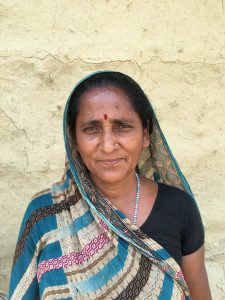 Nepal's law is not discriminatory. However, untouchability has gripped the society. We are poor and belong to lower caste. Since I am also a member of school management committee, I do not consider myself a victim of untouchability. But the case with other Dalits is different. I need to take initiatives to end this practice once and for all.
Nepal's law is not discriminatory. However, untouchability has gripped the society. We are poor and belong to lower caste. Since I am also a member of school management committee, I do not consider myself a victim of untouchability. But the case with other Dalits is different. I need to take initiatives to end this practice once and for all.
The majority of Dalits are ignorant about their rights, including registration of birth, marriage or death. Moreover, they hesitate to go to offices sans Dalits. My priority after winning the election would be to encourage them to come to the office and do all necessary official formalities. In addition, I will ensure that Dalits share same area during meals in parties.
"My success in election will encourage people of higher caste to visit my house"
Kumaridevi Paswan (45): Surunga Municipality-7 ward member candidate (Nepali Congress)
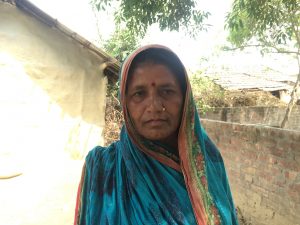 The practice of caste-based untouchability has been a serious problem. We take part in social gatherings of higher castes. However, when invited to our gatherings, they prepare their own meal. In fact, it was our misconception that we are lower caste people. Now, we have understood that we all are equal. Dalit women undergo lots of social problems, they are discriminated. If I get elected, higher caste people will undoubtedly visit my house and drink water. Dalit women are bound to tolerate all sorts of discrimination. Therefore, my concern is to wipe out such discriminatory attitude.
The practice of caste-based untouchability has been a serious problem. We take part in social gatherings of higher castes. However, when invited to our gatherings, they prepare their own meal. In fact, it was our misconception that we are lower caste people. Now, we have understood that we all are equal. Dalit women undergo lots of social problems, they are discriminated. If I get elected, higher caste people will undoubtedly visit my house and drink water. Dalit women are bound to tolerate all sorts of discrimination. Therefore, my concern is to wipe out such discriminatory attitude.
"Will ensure Dalit's entry in temples"
Shantidevi Mandal (28): Surunga Municipality-7 Haripur, Ward Member candidate (Nepali Congress)
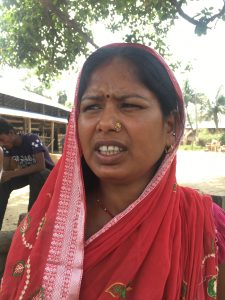 I will organize a feast after winning the election; encourage children to go to school. Since Dalits are not allowed to worship inside the temples, my priority would be to encourage them to go inside the temples and worship. I will take action against those who promote untouchability.
I will organize a feast after winning the election; encourage children to go to school. Since Dalits are not allowed to worship inside the temples, my priority would be to encourage them to go inside the temples and worship. I will take action against those who promote untouchability.
"Will take action against those promoting discrimination"
Ramwati Devi Ram (30): Surunga Municipality-7 ward member candidate (Maoist Center)
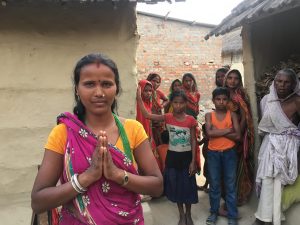 One day I was on the way to my field to reap wheat when a lady asked me to take the other way warning that I should not touch a jar of water, which was kept beside the path. When I asked her the reason, she quickly responded that God would be angry if I touched the water jar. I told her I pray the same God as she did. How can we expect positive changes from such people? In fact, caste is never higher or lower. However, village temples have been off-limits for low caste people like Dalits, Chamars, and Khatwe. Many of us do not understand or speak Nepali and are ignorant of constitution and law. Dalits here are not allowed to walk freely. Now I will take action against those who discriminates. Furthermore, I will spend the allocated budget to educate Dalit children.
One day I was on the way to my field to reap wheat when a lady asked me to take the other way warning that I should not touch a jar of water, which was kept beside the path. When I asked her the reason, she quickly responded that God would be angry if I touched the water jar. I told her I pray the same God as she did. How can we expect positive changes from such people? In fact, caste is never higher or lower. However, village temples have been off-limits for low caste people like Dalits, Chamars, and Khatwe. Many of us do not understand or speak Nepali and are ignorant of constitution and law. Dalits here are not allowed to walk freely. Now I will take action against those who discriminates. Furthermore, I will spend the allocated budget to educate Dalit children.
Sevodevi Paswan (35): Surunga Municipality-8 Ward Member candidate (CPN-UML)
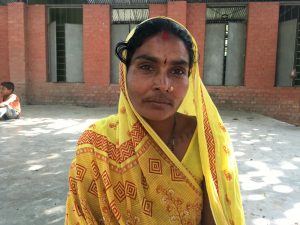 People ask me about my plans if I win the election. I have assured them of my support in all ways except for distributing money. Some voters even ask for money from us. My assurance of working towards ending discrimination and untouchability does not seem to be effective. Voters believe in money. Parents are uneducated therefore they do not send their children to school. Dalits are barred from entering temples. While women's day begins with cleaning, their husbands roam here and there. I will spend the budget for their skill development. Dalit women do not speak or understand Nepali. Therefore, educating them is a must.
People ask me about my plans if I win the election. I have assured them of my support in all ways except for distributing money. Some voters even ask for money from us. My assurance of working towards ending discrimination and untouchability does not seem to be effective. Voters believe in money. Parents are uneducated therefore they do not send their children to school. Dalits are barred from entering temples. While women's day begins with cleaning, their husbands roam here and there. I will spend the budget for their skill development. Dalit women do not speak or understand Nepali. Therefore, educating them is a must.



